
by Charles Bonniwell | May 20, 2022 | Main Articles
But Is It Really?
by Charles C. Bonniwell

Who’s The Real King? The Denver Post insinuated that Glendale is the Car Theft Capital of the U.S. in order to hide the fact that Denver by almost all metrics is the title holder.
Glendale brands itself as “Rugbytown USA,” the capital of rugby in the United States. Forty years ago, a book by Jack E. and Patricia A. Fletcher about Glendale was titled “Colorado’s Cowtown.” Today, thanks to a front-page article on “How did Colorado become one of the worst states for vehicle theft?” by John Aguilar, featuring a picture of Glendale City Hall which went national on MSN, Glendale is being called the auto theft capital of America.
How did a town which has relatively few auto thefts from its residents and even fewer cars stolen by its residents become the auto theft capital of America? Easy, stats. According to the National Insurance Crime Bureau, Colorado is the top state for per capita auto thefts with more than 500 vehicles per 100,000 residents. Glendale, in turn, has more auto thefts per resident than any other city in Colorado.
But Glendale, over the last four months through April, 2022, only had 79 auto thefts total which is not even a good night of auto thefts in metro Denver, which according to the Colorado Metropolitan Auto Theft Taskforce (C-MATT) the Denver metro area has on average nearly 100 vehicles stolen every day.
The article does sheepishly admit that the “unenviable designation is somewhat misleading given Glendale’s daytime influx of office workers and shoppers versus its residential population of approximately 5,200.”
“Somewhat misleading?” Glendale has a massive office and retail base compared to a small population. Pre COVID-19 pandemic, over 80,000 to 100,000 people per day came to Glendale according to Glendale city officials. The car thieves come overwhelmingly from metro Denver and steal cars of residents of metro Denver. As a practical matter since Glendale has only two single family homes, a large number of its residents take public transportation or ride shares and don’t even own cars to steal.
Why then stigmatize Glendale? Denver itself is, in fact, the auto theft capital of the United States by most metrics, but The Denver Post does not want to highlight that fact. It, in fact, can’t since it depends on the City and County government for subsidies to keep it profitable. Thus, talk about Glendale and its 79 car thefts in four months and skip over the thousands in Denver over the same period of time.
“It’s nothing new,” said Glendale Mayor Mike Dunafon. “The Denver Post and other media have at times, for decades, used Glendale as the punching bag to paper over any problems Denver is having.”
The mayor went on to state: “It’s not that we are unconcerned about the increase in auto thefts in Glendale and across the metro Denver area, but relatively speaking, car theft in Glendale happens far less than once per day on average. The changes in the state laws have resulted in car theft being viewed almost like jaywalking by some. Until the state rectifies what it has done, the problem will get worse. In Glendale and elsewhere if you are a person of modest means, having your car stolen means possibly losing your job, and making it hard to find a new job. I wish the State legislature and the justice system would care just a little bit more about the victims of car theft.”

Skyrocketing Thefts: Metro Denver saw a 107% spike in stolen vehicles from 2019 to last year.
Commander Mike Greenwald of C-MATT indicated that “97% of the people who have been arrested in the past three years for auto theft have multiple arrests for auto theft.” Denver Police Chief Paul Pazen told The Denver Gazette that: “We arrested one person six times for auto theft in 2021.” He pointed that Denver judges often release habitual car thieves to “personal recognizance” bonds, meaning they have to put up no funds and they just go back on the street and steal more cars.
An analysis of the “Colorado Crime Wave” by the Common Sense Institute in December of 2021, indicates that in Denver alone, personal recognizance bonds increased by 61% over the last two years and $0, $1 or $2 bonds by an incredible 1,879%.
Moreover, legal analyst Scott Robinson told 9News that “judges are reluctant to send car thieves to prison. Unless it’s fourth or fifth time unsuccessfully stealing cars.”
Glendale Police Captain Mike Gross indicates in Arapahoe County the backlog in the criminal system is so overwhelming that prosecutors will simply dismiss auto theft charges stati

Vehicle Theft Rate: Each of the 12 counties reviewed experienced an increase in their motor vehicle theft rate, although the range varied widely. While the motor vehicle theft rate only increased by 1% in Mesa County, it grew by more than 30% in six counties, including 46% in Pueblo, and 51% in Denver. Information obtained from the Common Sense Institute (commonsenseinstituteco.org)
ng they have more serious crimes to attend to.
Moreover, Captain Gross notes that Glendale, like almost every jurisdiction in metro Denver, has a “non-pursuit” policy where the police will not engage in a car chase for auto theft, so car thieves simply leave in the stolen car at top speed.
The Denver Post while acknowledging the complaints of law enforcement, gives strong support to the claims of so-called “reformers” such as Director of Advocacy for the ACLU Taylor Pendergrass, and State Representative Leslie Herod under the heading “Problem runs deeper.”
They blame the world-wide pandemic and problems that run deep in society. Herod stated that, “These things need to be addressed at their root cause.”
Mayor Dunafon laughed saying, “If we wait to address the car theft crisis in Denver and Colorado until we have solved all of the societal problems in the world as suggested by the Post we might just as well hand our cars over to the thieves. It would be so much easier and efficient.”
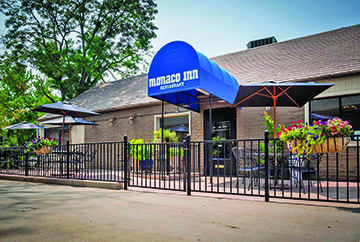
by Mark Smiley | Apr 21, 2022 | Main Articles
by Glen Richardson

Mom’s Special Day: After all the love, care, and cooking, Mother’s Day 2022 is just around the corner. Things to do range from music concerts and special menus at restaurants to high tea and Mother’s Day runs.
There’s a saying: “Life doesn’t come with a manual; it comes with a mother.
A teacher and a friend, she also takes care of the needs of the entire family. After all the love, care, and cooking, mom’s special day is just around the corner on Sunday, May 8.
Here’s the Chronicle’s choice of ways to celebrate with music concerts and special menus at restaurants, plus more to make Mother’s Day memorable:
Moms & Music
Brunch With Beethoven: Make your mom feel special this year by taking her to the Mother’s Day Brunch with Beethoven at Grant-Humphrey’s Mansion on Pennsylvania St., 8 a.m. to 3 p.m. Gourmet menu is from Chef Dane’s Kitchen on Gilpin St. Guests will enjoy Eggs Benedict, Tartines, Vegetable Quiche, Blueberry Rosemary Scones, Peach & Ginger Parfait, and Fruit Plate while listening to classical piano and a violinist. There will be a craft area for kids — ages 4 to 10 — to make a gift for mom. Information: 303-803-3727.
Mother’s Day Rock & Roll: Let mom and the kids move, play, and sing while listening to the music of the Beatles for kids. Bash is at the Bluebird Theater on E. Colfax Ave., 11:30 a.m. Information:303-377-1666.
Whitney Houston Tribute Brunch: Take mom to a musical tribute to Whitney Houston with singer Mary Louise Lee and her band in Centennial, 3 to 7 p.m. The event is at Piney Creek on E. Ida Dr. with brunch by Two Sistah’s Catering. Brunch includes Belgian Waffles, Scrambled Eggs, Potatoes O’Brien, Bacon, Turkey Sausage, Sweet Potato Coffee Cake, and Blackberry Cobbler. Information: 303-433-1000.
Brunch & Dinner
 Valley restaurants are hoping mom’s holiday 2022 will be a turnaround milestone in the pandemic age of economic recovery. Typically, Mother’s Day is one of the busiest times of the year. Nationally, reservations are running nine times higher than last year.
Valley restaurants are hoping mom’s holiday 2022 will be a turnaround milestone in the pandemic age of economic recovery. Typically, Mother’s Day is one of the busiest times of the year. Nationally, reservations are running nine times higher than last year.

Mother’s Day Magnet: The Monaco Inn Restaurant, a holiday hot spot for decades, is bringing back Mother’s Day. Serving from 3 to 9 p.m., specials include New York Steak and Fried Shrimp.
Monaco Inn Restaurant: Highlighting the turnaround is an announcement by this longstanding holiday hot spot that it will bring families together again for Mother’s Day, serving from 3 p.m. to 9 p.m. A dining experience like no other featuring Lamb Shank, Lamb Chops & Grilled Shrimp, New York Steak & Fried Shrimp, and Grilled Trout. The regular dinner menu is also available. Information: 303-320-1104.
Bistro Vendome: Chef Ariana is creating specials to serve alongside full menus for brunch 9 a.m. to 2:30 p.m. and dinner 4 p.m. to 10 p.m. Information: 303-825-3232.
Capital Grille: Downtown eatery on Larimer St. is opening early and serving their full dinner menu, as well as three brunch features from 11 a.m. to 2 p.m. Brunch choices are a Lobster Frittata, a 14 oz. Bone-In NY Steak & Eggs, or an 8 oz. Center Cut Filet Mignon. Information: 303-539-2500.
Carmine’s On Penn: Share a family feast at an Italian eatery offering to feed Mom with a family of 4-6 people. Deal includes Chicken Parmigiana, Meatballs, and a magnum bottle of wine. Information: 303-777-6443.

Brunch With Beethoven: One of this year’s special events is a catered music brunch at Grant-Humphrey’s Mansion from 8 a.m. to 3 p.m.
Citizen Rail: Restaurant in the Kimpton Hotel born on the 16th St. Mall has an all-you-can-eat brunch buffet with pastries, seafood, plus an omelet and prime rib station. Information: 303-323-0017.
Inga’s Alpine Tavern: Treat Mom at this hip holiday space in Glendale on Leetsdale Dr. offering full menu, 11 a.m. to midnight. The man of 1,000 songs Rob Wivchar entertains mom, kids & family. Information: 720-389-6203.
Jimmy’s Jersey St. Café: Eatery off of 9th Ave. & Colorado Blvd. is serving Roast Tenderloin & Fresh Seafood buffet. Choose from 10 a.m., noon, and 1:30 p.m. seating times. Information: 720-328-9481.
Ritz-Carlton: The Five Diamond hotel on Curtis St. is featuring an elaborate brunch buffet, a mimosa bar, plus a kids buffet. Families will receive a portrait to take home. Information: 303-312-3800.
Cooking Class

For Food Lovers: Consider treating moms that are connoisseurs of food to a Mother’s Day cooking class at Stir Cooking School.
Stir Cooking School: Take Mom to this Highlands neighborhood school for a Mother’s Day British Brunch Class, 1-4 p.m. A French Macaron Class is also offered. Information: 720-287-4823.
Tea Time
Mother’s Day Afternoon Tea: Babe’s Tea Room on 15th St. — next to Sushi Sasa — is offering Mother’s Day tea May 2-8. Featuring tea sandwiches, miniature scones, Scottish shortbread, French macarons, and a Bouquet of Pastry topped with a tier of Mother’s Day desserts. Information: 303-455-4832.
Tea At The Palace: Impress mom by taking her to the Brown Palace for afternoon tea, 11 a.m. to 4 p.m. She’ll enjoy herbal teas, scones, and finger sandwiches to the soft sounds of a harpist or pianist in the luxury setting. Information: 303-297-3111.
Tea At Le Rêve: Take mom to this intimate Cap Hill space on E. Colfax — French for Sugar — for an afternoon of luxury teas, noon to 2 p.m. Serving sandwiches and desserts. Information: 303- 522-6886.
Yoga With Mom
Morning Yoga: Nui Mani Yoga is offering a Mother’s Day yoga class at the Kentucky Inn on S. Pearl St. taught by Davina Lochi. Moms will be treated to a complimentary mimosa or bloody mary following the class. Information: 303-777-7550.
Mother’s Day Runs
Run For MS: Join the MS Relay America in partnership with Boulder Running Co. at the Cherry Creek Shopping Center for the 5K or 10K run plus a post-run brunch, 9 a.m. Information: 303-847-4123.
City Park 5K: The starter’s gun goes off at 9 a.m. for this year’s Mother’s Day 5K. Flippin’ Flapjacks cooks pancake-sausage breakfast for participants. Information: runsignup.com.
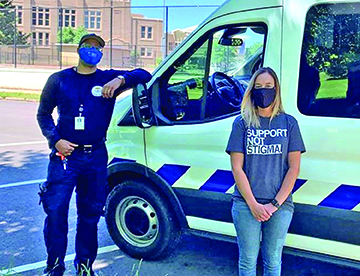
by Regan Bervar | Apr 21, 2022 | Main Articles
“What can oppose the decline of the west is not a resurrected culture but the utopia that is silently contained in the image of its decline.”
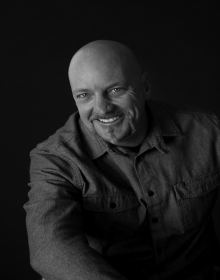 by Luke Schmaltz
by Luke Schmaltz
On the evening of April 5, 2022, Lowry United Neighborhoods (LUN) hosted a town hall meeting at Eisenhower Chapel to address widespread concerns about issues stemming from Denver’s unhoused problem.
The panel of speakers represented a cross section of agencies and organizations working directly and otherwise to have a positive impact on the unhoused crisis. The panelists included:
- HOST (Housing Stability and Homelessness Resolution): Deputy Director, Angie Nelson
- Denver City Attorney’s Office: Director of Prosecution and Code Enforcement, Marley Bordovsky
- Salvation Army: Major Richard Pease and Denver Metro Social Services Director Christine Baluyot
- STAR (Support Team Assisted Response): Operations Manager, Carleigh M. Sailon
- Colorado State Senator, District 31, Chris Hansen
Additionally, Denver City Councilwoman Amanda Sawyer (District 5) was on hand to answer questions and offer commentary.

STAR (Support Team Assisted Response) responds to non-violent 911 calls in place of police officers.
The briefing for the meeting stated: “LUN presents this discussion because of widespread frustration that millions of dollars and years of work have brought only fragmented remedies. Along with homelessness, comes health and safety impacts harmful to those who live on the streets, as well as to other citizens of Denver.
“LUN has assembled this panel of local leaders to help us better understand the challenges for the homeless and unhoused in our city and for the agencies who serve them. The panel will discuss the spectrum of services and housing options designed to assist unhoused individuals in Denver and what those efforts have achieved.”
Denver7 Reporter Russell Haythorn acted as discussion moderator. The following is a condensed version of the 90-minute meeting, highlighting some (but not all) key points made by each speaker.
Angie Nelson — Housing Stability and Homelessness Resolution
The HOST Deputy Director holds a master’s degree in social work as well as a bachelor’s degree in pre-professional counseling. Administrators appointed Nelson to her position in March of 2021. Nelson was thorough in explaining the scope of the unhoused issue and laid out, in great detail, what her organization and others working in this field are up against. “We invest resources and help to create policies and empower partnerships to help across the whole spectrum of homelessness through housing opportunities” she began. “We are helping keep folks in the homes they have through programs such as rental assistance, utility assistance and home repair and modification. We help to quickly resolve episodes of homelessness through a variety of programs such as street outreach and shelters to programs such as supportive housing. Some of our key performance measures are that we hope to see a 50% reduction in unsheltered homelessness in the next five years.”
Moderator Russell Haythorn (questions relayed from audience members): “How does HOST control, monitor, and enforce policies regarding substance abuse and also, does HOST help connect its clients with resources for mental health and substance abuse treatment?”
Angie Nelson: “Within our programs we seek to make sure there is a holistic response. So, our housing programs aren’t housing only, they are housing first, but they are also there to support services that are going to help someone meet their needs when it comes to mental health or substance abuse so that people have the support they need to get stable and stay stable.”
Marley Bordovsky — Denver City Attorney’s Office
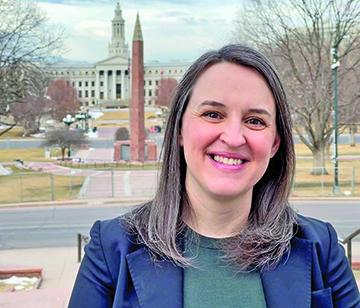
Angie Nelson is Deputy Director of HOST and is contending with a massive, complicated issue.
Moderator Russell Haythorn: “Under what circumstances does the City Attorney’s Office become involved with individuals who are experiencing homelessness?”
Marley Bordovsky: “I am at a cleanup most every day of the week to make sure our city agencies are solid in how they are conducting themselves and making sure they are abiding by all the settlements they have to abide by,” she began. “So, we provide boots on the ground legal guidance for the city agencies involved in the process. I want to highlight … a lot of our specialty dockets that are instrumental in crafting and creating with our court partners and city partners and also in staffing with attorneys. We have an outreach docket that we staff every other Wednesday. It started at the Denver Rescue Mission where we actually held court during Covid. The concept is to bring the court to where you are. It’s one thing to say, ‘You need to be in court on this day and if you’re not here we’re going to issue a warrant for your arrest.’ A lot of folks can’t make it down to the courthouse for a lot of reasons, whatever it might be, so this is an attempt to bring court to you so that it is a much lower barrier. We have a wellness docket that is a way to divert you out of the criminal justice system. There is a court component of it, where if you have outstanding warrants, we can help clear those warrants for you so you’re not getting arrested and going back into the cycle.”
Bordovsky supplied attendees with a two-sided handout explaining the complexities, constraints and parameters that most workers must follow when conducting cleanups of public encampments. “ For the cleanups we do three times a week in general around the city, there are some serious legal constraints that we abide by,” she began. “We have to post a large-scale cleanup for seven days minimum. It’s very structured as to how that posting is done. [Notices] are put on the tent, put around the perimeter, we have to define the perimeter of the area we are cleaning up. On the back of it is always the services that Angie’s team (HOST) provides for folks if they are interested.”
The Salvation Army — Major Richard Pease and Denver Metro Social
Services Director Christine Baluyot
Major Richard Pease offered a brief summary of his organization before answering questions. “We are an international organization,” he began, “But here in the United States (last year) we touched the lives of about 25 million Americans through our social services programs, which means nationally, outside of the Federal government, we are the largest provider of social services in the U.S.”
Moderator Russell Haythorn: “Describe specific programs and intended outcomes for those experiencing homelessness.”
Richard Pease: “In Denver, we have a family shelter called the Lambeth Family Center which is in west Denver. It currently has 20 units for families experiencing homelessness. It’s a 90-day program with the intent of getting folks stabilized in their housing. From day one they meet with case managers to help them get to permanent stable housing. About 74% of families who enter into our programs exit into stable housing which is well above that national norm for that type of program. We are in the process of developing an expansion on Alameda (we call it the Alameda Campus) that will include a new, state-of-the-art 85-unit program for families. Our goal is to get that built and open by the end of 2024.”

Lowry United Neighborhoods (LUN) is the official RNO (Registered Neighborhood Organization) of the district.
Christine Baluyot: “Some things we have learned about successfully moving people who are unhoused into stable or permanent housing are [in] the Denver Housing Collaborative. This is a really exciting approach that is really innovative. It’s a partnership between HOST and a few different organizations here in Denver (Colorado Coalition, Urban Peak, and others). We had this [big] increase in people experiencing homelessness, filling up hotels, taking up shelter beds, and we were not able to move them out. It [the Collaborative] came about as a result of a conversation between all of us partners and the city. As a result, we have been provided the funding to have case management teams, housing navigation teams — all of us working together as a collective which has never happened before. There is funding to be able to get people directly into housing and it is not tied to a lot of the restrictions of most of the Federal funding we get.” Baluyot went on to explain why this particular type of funding versus Federal funding is so effective — because it is available immediately and can be implemented with expediency. “This is the key reason as to why Crossroads has been so successful in getting people into housing, because we can say, ‘Hey, do you want housing? They say yep and the next week, they are in housing.’”
STAR (Support Team Assisted Response) Operations Manager Carleigh M. Sailon
Moderator Russell Haythorn: “Tell us about STAR and what initiatives STAR is involved in.”
Carleigh Sailon: “STAR [is] a civilian response program that pairs a mental health clinician with a paramedic or EMT and they are dispatched to low-risk, low-acuity calls coming into the 911 system. While we are not just a homeless outreach team, we focus on resource requests, transportation requests, behavioral health issues, substance abuse issues — anyone who is experiencing some sort of crisis in the city and county of Denver and calling 911 or police non-emergency for assistance with that crisis. About 60% of the individuals we have responded to in the last month have been unhoused. When a call comes into the 911 communication center, it screens for risk. Is there a weapon, is there an injury, is there a time-sensitive issue where we have to send an armed response? Or is someone safe enough to wait for a non-emergent response? Is there a public safety issue? Has a crime been committed? If all those answers are no, then our civilian call-takers and dispatchers can start thinking about if STAR should be sent. While police, fire, or EMS are sometimes the right answer, they are not always the right fit for every scenario. [We are] trying to send folks who have the appropriate expertise [for] the issues we are facing.”
Colorado State Senator Chris Hansen
Moderator Russel Haythorn: “Do you agree that Denver and Aurora carry the primary budgetary responsibility for providing housing and services for those experiencing homelessness?
Senator Chris Hansen: “There is an important state role that is being played in responding to this crisis we are in. We have built a system that has a lot of local governments being the front door for providing services, but the state has a super important role to play. I have the job of leading the state Senate on the Joint Budget Committee and the Senate Appropriations Committee. We are making some very big budgetary decisions and I have some great news to share with everybody tonight. There is a very large response from the state budget to help local governments — Aurora,
Denver, etc. It is a statewide crisis, and we are trying to respond to that in a statewide way. In this budget, we have set aside 200 million dollars for addressing the crisis directly. About half of that is going to end up coming to Denver and Aurora. On top of that, accommodation of state funds and Federal AARPA dollars, the relief act that was passed last year, Colorado received about four billion dollars. We are going to be using about a quarter of that for mental health supports, behavioral health supports, addiction services and housing programs across the spectrum. So, the state is taking some comprehensive steps in this budget.”
Denver Councilwoman Amanda Sawyer, District 5
Moderator Russell Haythorn: “Given that the city has provided funds for the Denver Rehousing Collaborative, are you tracking subsequent reduced costs in GDPR visits, vagrancy, an
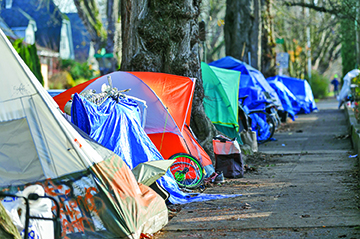
Marley Bordovsky of the Denver City Attorney’s Office explained the complexities of conduction sweeps of homeless encampments in Denver.
d has there been enough data? What are you seeing?
Councilwoman Amanda Sawyer: “This is a huge issue and what you’ve heard tonight is probably a third of what actually goes on behind the scenes in terms of all the different programs, responses, and opportunities that there are. In terms of the question that was asked, we don’t have the data yet to show whether it’s working or not. I will tell you, the most incredibly frustrating thing for us is when we see no response at all or a slow response when it feels like it should be a quick fix. It feels like it should be something very simple, and we make it a lot more complicated on the governmental level. Things are so siloed, organizations aren’t talking to each other, I know you feel that, and we feel it too — especially when we hear from someone who is unhoused [say] ‘I was unhoused in Greenwood Village and they gave me a bus ticket to Denver.’ I think what you have heard tonight is the start of real solution-oriented conversations. We know there are a number of residents experiencing homelessness who need mental health support services. There just aren’t enough beds in the state for them. We know there’s a portion of people who need long-term substance abuse recovery support. There aren’t enough beds. But the conversation is starting and at the end of the day the city doesn’t have the financial resources to solve homelessness on our own. We have to have state support. We have to have federal support. Right now is an extraordinary time because we have that funding available. We don’t have the data yet to show this is working. It’s gonna take time to build more facilities and more beds. Senator Hansen mentioned there is a 250-bed program that is working really well. We have approximately 4,000 homeless residents in Denver. We would need 16 of those facilities to be able to support the homeless community.”

by Mark Smiley | Apr 21, 2022 | Main Articles
Nebraska Plans To Use Eminent Domain To Take Colorado Land, Build A Canal To Divert Denver Destined Water Into Husker State
by Glen Richardson

Deepening Drought: Eight western states are in severe drought conditions and Nebraska isn’t one of them. Map shows levels of drought, much of it severe (dark orange), extreme (red), or exceptional (dark red). Data is from the National Drought Mitigation Center.

Fishing Vs. Feedlots: With more cattle than people, Nebraska seeks more water for its 1.94 million head of cattle. It takes 1,847 gallons of water to produce a pound of beef. The South Platte is also a gold medal western trout river. Photo Courtesy of Danny Frank, Colorado Trout Hunters
Nebraska — with more miles of rivers than any other state — is planning to build a canal into Colorado to drain water from the South Platte River before it can be enjoyed or used by Denver.
Nebraska Governor Pete Ricketts, the state’s attorney general, and the Nebraska legislature have given approval to divert water from the South Platte under a 1923 compact. Nebraska claims Colorado is planning to build projects to serve the Denver area and use the water before it gets to Nebraska.
Nebraska proposes to build more than 60 miles of canals and several reservoirs under a 1923 agreement between the two states. Cornhusker state news sources report, “the project would cost $500 million and be the biggest nonfederal project in decades.” The idea isn’t exactly new, Nebraska attempted to start a canal here before World War I, but ran out of funds and abandoned the project. Denverites can still see relics of the project from Interstate 76 near Julesburg. In the 1980s the state tried to restart the project, but it also failed.
No Set Water Volume
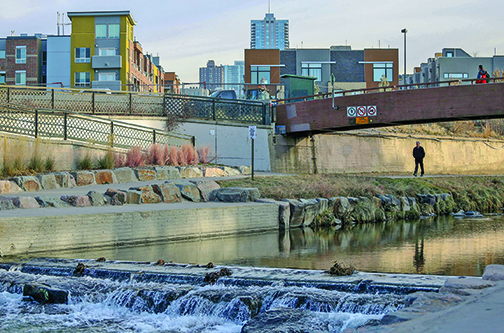
Water Wager: Nebraska is seeking to build a canal into Colorado and drain water from the South Platte River. Shown here as the river flows through Denver at Confluence Park, the plan would destroy outdoor activities in and around the city. Photo Credit: AP Photo/Brennan Linsley
Nebraska is seeking to build a canal into Colorado and drain water from the South Platte River. Shown here as the river flows through Denver at Confluence Park, the plan would destroy outdoor activities in and around the city.
“There is no set volume of water Colorado must allow to flow into Nebraska each year,” according to Kevin Rein, Director of the Colorado Division of Water Resources established in 1881. The Denver native, who is also the state’s engineer, adds, “Currently, the state is meeting all its water obligations to Nebraska.”
From April 1 to Oct. 15 — the irrigation season — the South Platte must flow at 120 cubic feet per second into Nebraska. The flow is measured at a water gate in Julesburg south of the Colorado border, Rein explains. During the non-irrigation season, there is no such requirement for the state and officials believe, “Colorado has uninterrupted water rights for the South Platte.”
Should flows drop below the threshold, the state must curtail water use to certain areas for water right holders whose rights were established after 1897.
Deals With Nine States
Snowmelt from the Rocky Mountains of Colorado is the prime source of water for the West. The state has signed nine compacts with other states over the years to define how much water each can use and the amount they must let flow downstream to neighboring states.
Nearly a century ago when Colorado River water was divvied up, it was a wetter period than normal. As a result, states vastly overestimated the river’s annual flow. Currently the river’s reserves are especially low, yet states are still claiming the same amount of water as they always have.
Presently eight western states are in severe drought conditions — California, Arizona, Nevada, Oregon, Washington, Idaho, and Montana — and Nebraska isn’t one of them. The most recent University of Nebraska Drought Monitor indicates that, “98% of the state is in at least a moderate drought.”
Mega-Drought
For all the warnings people in Denver get about turning off sprinklers and taking shorter showers, agriculture uses by far the most water. Ranching and farming uses more than 70% of the water that flows from the Colorado River to the seven river basin states.

Beauty Of The River: Beautiful and scenic, the South Platte offers splash-worthy adventures. It is amazing to walk along the river and enjoy the relaxing view, free from city distractions.
The West’s current mega-drought is the driest 22-year period since the year 800 C.E. The NOAA Spring Outlook predicts prolonged, persistent drought in the West with below average precipitation.
Intensifying drought and declining reservoir levels have prompted the first-ever cuts to Arizona from the Colorado River. Canals are empty and Arizona crops are weathering. Lake Powell’s massive Colorado River reservoir is at its lowest level on record. A hydroelectric plant on Lake Powell that feeds electricity to millions needs only to fall 35-ft. and it could no longer support power generation.
Cattle Vs. People
A major reason Nebraska requires so much water despite a moderate drought compared to other western states is the number of cattle. There are 1.94 million head of cattle in the state compared to just 1.8 million people.
Nebraska is the nation’s top cow/calf, cattle feeding, and beef processing state. It takes 1,847 gallons of water to produce one pound of beef.
Growing crops to feed animals consumes 56% of the water used, and in 2021 Nebraska planted 9.9 million acres to corn. More than 1.85 billion bushels were harvested last year, up 17% from 2020, making Nebraska the nation’s third largest corn producing state.
About The Platte

Fiddling With Flow: The Platte River begins high in the Rocky Mountains of Colorado, then flows through central Denver at the confluence with Cherry Creek pictured here.
The river begins high in the Rocky Mountains of Colorado, then flows through central Denver at its confluence with Cherry Creek. From Colorado’s Great Plains the river goes into Western Nebraska until it reaches the Missouri River at Plattsmouth, Neb.
In and around Denver it is popular for hiking, biking, and fishing. The South Platte is a gold medal western trout river. The river serves as an important part of the continental bird migration route, providing habitat for sandhill, whooping cranes, and millions of other migrating birds.
At the end of March, the federal government announced it was awarding Denver $350 million to pay for sweeping renovations to the South Platte. It will restore aquatic, wetland, and riparian wildlife habitats along the river. The project is expected to create 7,000 jobs and protect area homes and other structures from flood risk.
Nebraska Proposal Impact
Western states have been fighting over water since the start of the 20th century, and the latest Nebraska proposal suggests those fights will only intensify amid rising populations as climate change reduces snow-rainfall. The most obvious scenario is the two states will end up in court to determine whether Nebraska can use eminent domain to build the canal and whether it can take more water out of the South Platte if it’s built.
A few argue Nebraska is simply using the proposal as leverage to get Colorado to the negotiating table. However, water professionals believe Colorado’s hand is a “royal flush” and the state won’t consider a counteroffer.
Moreover, the 1923 compact allows Colorado to build a 35,000-acre-feet reservoir in the lower section of the South Platte River and make future appropriations in the upper section. Both uses take precedence over Nebraska’s claim.
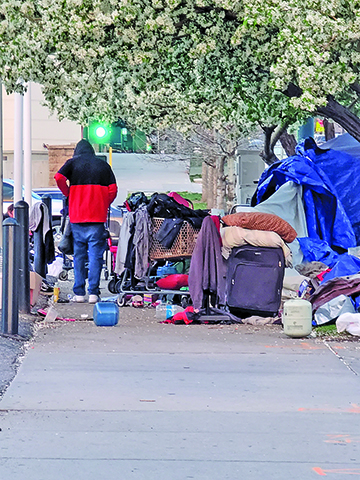
by Regan Bervar | Mar 18, 2022 | Main Articles
“Well, if there ain’t gonna be any rules, let’s get the fight started.”
 by Luke Schmaltz
by Luke Schmaltz
Terry Hildebrandt, PhD, is at war. The Denver district where he lives — the Golden Triangle — is anything but a gilded community of urban bliss. On any given day, he encounters the detritus of illegal campers which can include feces, trash, burned up tents, used needles, and more. At all hours of the day and night, Hildebrandt contends with fighting between encampment tenants, incessant screaming, blocked sidewalks, theft of businesses and residences, sexual abuse, and physical altercations which threaten his safety, that of his neighbors, and just about anyone else who enters the area.
Two Steps Back
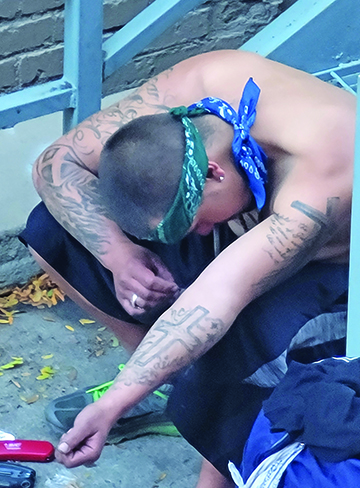
The alley behind Hildebrandt’s office has been dubbed “Heroin Alley.”
The latest installment of feckless legislation poised to exacerbate spiraling crime was signed into law by Governor Jared Polis in early July 2021, and enacted on March 1, 2022. For Terry Hildebrandt, the most concerning features of Senate Bill 271, the Misdemeanor Reform Bill, “is that the law now allows certain felons to possess guns, making it harder for police to remove guns off the streets, due to a change to Colorado Revised Statutes Section 346: 18-12-108 regarding possession of weapons by previous offenders,” he explains.
“Previously, all convicted felons were prohibited to buy or possess firearms. Now, many felons will be allowed to possess firearms, unless they were convicted of Victims’ Rights Act offenses, such as murder, child abuse, and sex assault. For example, this means all previous offenders convicted of felonies that were related to drugs, burglary, arson, and many other reasons will now be allowed to possess guns. Both 18th Judicial District Attorney John Kellner and Denver Police Chief Paul Pazen have publicly expressed serious concerns about SB21-271 and the likely impact it will have on crime rates in Colorado due to more felons being allowed to possess guns.”
The New Skid Row
Meanwhile, Hildebrandt is fighting for the sanctity of the downtown Denver community at large and for the dignity of those who choose to call the Golden Triangle home. Defelonization of the possession of illegal drugs and use of illicit substances, along with the neutralized authority of a Denver Police Department, has turned his district into an urban hellhole. “During the summer of 2021,” he begins, “I had to call 911 to report a man passed out in the alley right by 10th Ave, laying in the way of traffic on the hot concrete. The man could have been run over by a car since that is a busy alley. The Fire Department arrived quickly to check on him. It was around 95 [degrees] that day, so heat stroke was a real possibility,” he says.
Hildebrandt continues, “In 2021, we had a lot of heroin and meth open use in the alley right outside my home and business, which I renamed to Heroin Alley. I have dozens of photos of addicts with heroin needles in their arms and toes and smoking meth and fentanyl. We regularly found used needles all over in the Golden Triangle neighborhood. I was calling 911 up to five times a day to report open drug use and other health crises in my neighborhood. In 2021, I joined forces with a nonpartisan, diverse group of like-minded people, to cofound the nonprofit, Citizens for a Safe and Clean Denver,” he explains.
Complicated Circumstances
Hildebrandt is quick to point out he is not simply condemning the dangerous conditions in his community. He is instead, pointing to contributing factors, such as how many of his property-owning peers choose to simply look the other way rather than insist upon the city doing better. The current policy is for authorities to offer treatment services and shelter to the unhoused living in tents (which is almost universally declined) rather than insist on it — especially for people suffering from addiction and/or severe mental illness. “I see no excuse left to ever tolerate allowing anyone to rot on the street in an illegal tent to overdose and freeze to death,” he says. “How is there any dignity for the unsheltered in allowing dangerous, illegal enc

The Golden Triangle district in downtown Denver is dangerous to all residents, housed and unhoused.
ampments to remain?”
“The sad part is that Denver can find shelter for everyone on the street,” Hildebrandt says. “Skye Stuart (Legislative Director & Sr. Advisor for Policy & Legislation, Mayor’s Office) at Public Hearing: CB 21-0592, said, ‘I do want to be clear that we do have hundreds of beds available every night. If every person off the street wanted to come in, would we need to do some things — like open some rec centers — absolutely, but we do have some flexibility in our system that will accommodate for that.’”
Passing The Buck
Meanwhile, people who are arrested for offenses such as drug dealing, burglary, trespassing, automobile theft, sexual assault, harassment, and other crimes are being inexplicably released by the courts on PR (personal recognizance) bonds in a matter of just a few hours after being detained. Hildebrandt has voiced his concerns to top officials, stating, “We met with District Attorney Beth McCann, and she blamed the judges for releasing accused criminals on PR bonds. McCann took no responsibility for the dramatic increase in accused dangerous criminals being released on PR bonds while awaiting trial, saying that the judges set bail — not the DA,” he says.
Hildebrandt continues, “McCann also told us that she has no data readily available to us to understand which judges are to blame for this mess. I am deeply frustrated and disappointed in the lack of accountability in the judiciary. The public has no easy way to hold judges accountable for releasing dangerous, violent criminals, and drug dealers to re-offend. Tony Kovaleski at Denver7 reported that data from open records laws from the courts show 1,298 arrests for felony drug offenses. The data also show that 69% of all accused individuals arrested for those drug offenses were granted PR bonds and show that 45% of individuals arrested for felony drug offenses and granted a PR bond failed to appear for at least one court hearing,” he explains.
To say these circumstances are discouraging to law enforcement officials with “boots on the ground” would be an understatement. “I have personally witnessed the negative impact on the
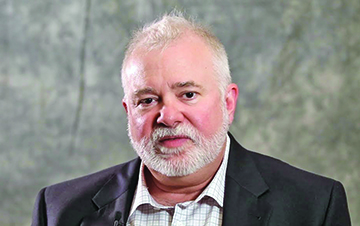
Dr. Terry Hildebrandt, PhD. lives and works in the Golden Triangle district which has become an urban hellhole.
morale of our police force when accused, violent criminals and drug dealers are released after the police risked their lives to arrest dangerous criminals,” Hildebrandt says. “I have also seen the frustration and fear of victims, who are subject to the same perpetrators over and over when these criminals are back in the community where they can re-offend.”
A Glimmer Of Hope
Despite the host of setbacks in his front yard, Terry Hildebrandt is focused on solutions. He is quick to point out that legislation which is counteractive to SB 21-271 has been introduced. “HB 22-1257 just passed the house,” he says. “It will help fix some of the issues if it passes in the Senate. [It] would add certain felony offenses, such as criminal extortion, enticement of a child, unlawful termination of pregnancy, and arson, back onto the ‘possession of a weapon by a previous offender’ (POWPO) list. However, it does not fix the issue of felons with drug convictions being allowed to possess guns,” he explains.
Extreme Measures
Some citizens are fed up, mistrustful of the legal system, and doubtful that law enforcement will come to their aid should they be accosted, assaulted, attacked, robbed, or worse. What then, you might ask, can you do to bolster your personal safety?
There are numerous Denver enterprises in the business of teaching people to protect themselves from violent criminals. This is not a new idea, rather, it has been a celebrated aspect of daily life in the Mountain West region since before the Mile High City was founded back in 1876. For a fair price, any able-bodied adult or minor with parental consent can learn to safely and proficiently operate, carry (18+ only), and maintain a firearm intended for self-protection. Places such as Lipstick Tactical (emphasizing women’s safety), BluCore Shooting Center, and Final Protective Line Academy are centers of education, awareness, and training for law-abiding citizens concerned with their personal safety. These and other similar enterprises are ideal places for garnering the proper training, knowledge, and testing required for obtaining a conceal and carry license.
If firearms are not your cup of tea but personal safety is, Denver offers a wealth of destinations for self-defense training in hand-to-hand combat styles such as Krav Maga, Jiu-Jitsu, Kung Fu, and many, many more. Folks too busy to take on a new discipline are wise, at the very least, to invest in practical means of deterring assailants such as pepper spray, bear spray, mace, or some similar, user-friendly device. If the government will not exact punishment against those who aim to harm law-abiding citizens — then the populace at large must assume sole responsibility for their own wellbeing. As for those who choose to harm themselves on the taxpayers’ dime — that mess, for now, is still your problem.
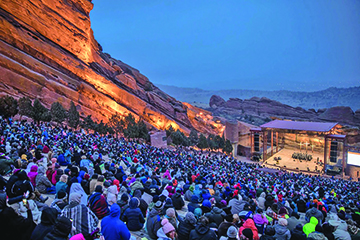
by Mark Smiley | Mar 18, 2022 | Main Articles
Easter Won’t Fall Until Day After Full Moon On April 17
by Glen Richardson
Easter Sunday is uncommonly late this year, falling on April 17 for the first time in 62 years. The holiday will keep us waiting in 2022, but not because of disruptive supply chains, instead blame the moon.
Christian tradition sets the holiday on the first Sunday after the first full moon occurring on or after the vernal equinox, the start of

April’s Full Moon: The first full moon of spring is Saturday, April 16. Known as the Paschal full moon, it is pushing Easter to the 17th for the first time in 62 years.
spring. This year, the first full moon of spring — the Paschal full moon, Christians call it — comes on Saturday, April 16, pushing Easter and Valley Sunrise Services to the 17th.
Just after the March 20 vernal equinox occurs, spring shifts into overdrive as flashy, flamboyant, and fe minine fashion flares into an Easter parade of runway shows. Floaty floral outfits and pretty dresses from quality labels that ooze romantic style, parade on the catwalk of Denver’s Ephemera Fashion West Runway Show at ReelWorks March 27, 5 p.m.-2 a.m. That’s followed by seven nights of Denver Fashion Week with 250 models, April 3-10. Forbes Magazine has proclaimed the Valley’s annual spring showcase, “One of the fastest growing American fashion platforms.”
Spring Fashion Parade
LoDo-based fashion designer Brooks Luby whose outfits are on parade in this year’s Ephemera show, tells the Chronicle, “Soft, free flowing garments in neutral and bright colors are in this year.” Making women feel special for spring and summer since 1974 — the designer-couturier with a studio at 1616 14th St. — Luby adds, “Natural fabrics that are easy to wear and breathe in the heat of summer make women feel confident while being comfortable and stylish.” Information: 303-573-3801.
Then April kicks off Denver Fashion Week with a series of runway shows bringing together designers, models, stylists, and show-goers. Unique to Denver and the Cherry Creek Valley, this year’s events are at the Forney Museum of Transportation on Brighton Blvd. and Void Studios on S. Bannock St. Produced by 303 Magazine — a Denver online lifestyle daily — the event opens by bringing back its kids’ fashion show on April 3 from 3-6 p.m. at Void

Easter Beauty: This linen sheath dress by LoDo-based fashion designer Brooks Luby is perfect for Easter. It is seasonless, has pockets, and can go day to date night.
Studios. Introducing the fashion world to kids ages 8-13, the event will showcase some of the Valley’s top kids’ boutiques.
Designs featured on the following days during the week-long fashion event include Streetwear, Wardrobe, Local Couture, National-International, and Sustainable. The week concludes by showing lifestyle clothing lines from outlets at Castle Rock April 10, 4-8 p.m. Two days later on April 12, the Spring Brass Ring Luncheon-Fashion Show is at the Hilton City Center beginning at 10 a.m. The Children’s Diabetes Foundation fundraising event features LA-based designer Lourdes Chavez who worked for famous fashion house Travilla before launching her own line in 2000. Information: 303-863-1200.
Easter Shopping
Cherry Creek North is known for its fashion boutiques and Adornments at 2826 E. 3rd Ave. is recognized for its unique and artistic fashions. Ladies credit longtime staffer and now owner Consuelo Diaz-Nasios as having a discerning eye for fashionable and flattering cloth
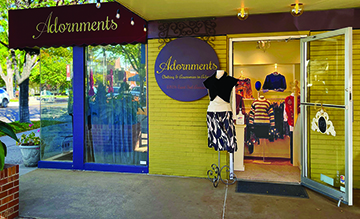
Shopping Season: Cherry Creek boutique Adornments on E. 3rd Ave. is known for its unique and artistic fashions. Spring womenswear by Igor Dobranic — designer behind the IGOR fashion brand — is among spring selections on display, at right.
es. Information: 303-321-7992.
Offering a distinctive assortment of top women’s designer and contemporary collections from all over the world, MAX Clothing at 250 Columbine is considered one of the district’s style leaders. Information: 303-321-4949.
One of the Valley’s most iconic men’s and women’s specialty stores is Lawrence Covell established in 1967. Located at 225 Steele St., many fashion brands make their Colorado and, in some cases, national debut here. Whether you’re looking for preppy, eclectic, Bohemian, sexy, conservative, classic, or hipster they offer something special and different. Information: 303-320-1023.
Red Rock’s 75th Easter
Following a virtual service last year, the 75th Easter Sunrise Service at Red Rocks Amphitheatre — the most renowned sunrise service in the nation — will rise again as an in-person gathering on April 17. Gates open for the non-denominational service at 4:30 a.m., music begins an hour later, followed by worship service at 6 a.m.

Rockin’ Red Rocks Easter: Following a virtual service last year, the 75th Easter Sunrise Service at Red Rocks Amphitheatre will rise again as an in-person gathering on April 17. Gates open at 4:30 a.m., worship service begins at 6 a.m.
As the sun begins to rise above the naturally occurring geological phenomenon — this year at 6:19 a.m. — a capacity crowd is expected. The Colorado Council of Churches will again produce magnificent music and a stunning sermon that changes the jaw-dropping sunrise into a performance not to be missed.
The Rev. Dr. John Yu, lead pastor of Aurora’s True Light Community Church, will deliver this year’s gospel message in the dramatic setting. He is the 2022 president of the Pastors’ Assn. of Korean
Churches in Denver and serves on the National Caucus of Korean Presbyterian Churches. Information: 303-825-4910.
The Valley’s other major Sunrise Service is the Western States Easter Observance at the Denver Scottish Rite Masonic Consistory, 1370 Grant St., 6-9 a.m. Seating 500, the Consistory is a unique worship experience. Moreover, attendees can enjoy a hot breakfast in the Consistory’s dining room following the worship service. Information: 303-861-4261.
Scrambling For Eggs
Glendale Sport Center’s Easter Egg-stravaganza is at Infinity Park’s turf field April 9, 10 a.m. Bring your camera and Easter Basket for the free event that has three prize eggs with special surprises. Event features three age groups — ages 0-3, ages 4-6, and 7-13, all startin

Catwalk Glam: Flashy, flamboyant and feminine fashion flares into an Easter parade of runway shows this month. Photo is from Glam Night during a prior Denver Fashion Week. The seven nights of glamour with 250 models is April 3-10.
g at the same time. Information: 303-639-4711.
Stapleton’s annual Egg Scramble is April 9 at Runway 35, 10-11:30 a.m. Children ages 0-5 start at 10:05 a.m. with one parent allowed per child. The next wave is at 10:20 a.m. for ages 6 and older (parents not allowed). Event has an Easter bunny, food trucks, a magician, a balloon artist, and a face painter.
Cook Park Recreation Center hosts a Bunny Eggstravaganza on April 16 at the park on Cherry Creek S. Dr. from 10:20-10:50 a.m. Take pictures, play games, and go on an Easter egg hunt. Information: 720-865-3400.


























